NCERT Solutions For Class 6 Maths Fractions Exercise 7.4
Free download NCERT Solutions for Class 6 Maths Chapter 7 Ex 7.4 Fractions PDF for CBSE 2020 Exams.
You can also Download NCERT Solutions for Class 6 Maths to help you to revise complete Syllabus and score more marks in your examinations.
- Fractions Class 6 Ex 7.1
- Fractions Class 6 Ex 7.2
- Fractions Class 6 Ex 7.3
- Fractions Class 6 Ex 7.4
- Fractions Class 6 Ex 7.5
- Fractions Class 6 Ex 7.6
NCERT Solutions for Class 6 Maths Chapter 7 Fractions Ex 7.4
Exercise 7.4
Question 1.
Write shaded portion as fraction. Arrange them in ascending and descending order using correct sign ‘<‘, ‘=’, ‘>’ between the fractions.
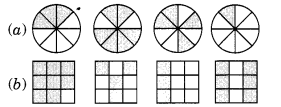
(c) Show \(\frac { 2 }{ 4 }\) , \(\frac { 4 }{ 6 }\) , \(\frac { 8 }{ 6 }\) and \(\frac { 6 }{ 6 }\) on the number line. Put appropriate signs between the fractions given.
![]()
Solution:
(a) Total number of divisions = 8
(i) Number of shaded parts = 3
∴ Fraction = \(\frac { 3 }{ 8 }\)
(ii) Total number of divisions = 8
Number of shaded parts = 6
∴ Fraction = \(\frac { 6 }{ 8 }\)
(iii) Total number of divisions = 8
Number of shaded parts = 4
∴ Fraction = \(\frac { 4 }{ 8 }\)
(iv) Total number of divisions = 8
Number of shaded part = 1
∴ Fraction = \(\frac { 1 }{ 8 }\)
Now the fractions are:
\(\frac { 3 }{ 8 }\), \(\frac { 6 }{ 8 }\), \(\frac { 4 }{ 8 }\) and \(\frac { 1 }{ 8 }\) with same denominator.

(b)(i) Total number of divisions = 9
Number of shaded parts = 8
∴ Fraction = \(\frac { 8 }{ 9 }\)
(ii) Total number of divisions = 9
Number of shaded parts = 4
∴ Fraction = \(\frac { 4 }{ 9 }\)
(iii) Total number of divisions = 9
Number of shaded parts = 3
∴ Fraction = \(\frac { 3 }{ 9 }\)
(iv) Total number of divisions = 9
Number of shaded parts = 6
∴ Fraction = \(\frac { 6 }{ 9 }\)
∴ Fractions are \(\frac { 8 }{ 9 }\), \(\frac { 4 }{ 9 }\), \(\frac { 3 }{ 9 }\), \(\frac { 6 }{ 9 }\) with same denominator.
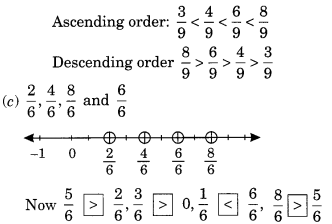
Question 2.
Compare the fractions and put an appropriate sign.

Solution:
![]()
Here, denominators of the two fractions are same and 3 < 5.

Here, numerators of the fractions are same and 7 > 4.

Here, denominators of the two fractions are same and 4 < 5.

Here, numerators of the two fractions are same and 5 < 7.
![]()
Question 3.
Make five more such pairs and put appropriate signs.
Solution:
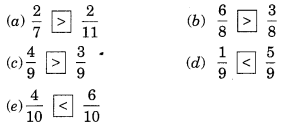
Question 4.
Look at the figures and write ’<’, or ’>’ ’=’ between the given pairs of fractions.
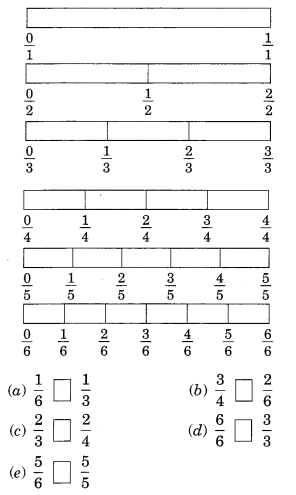
Make five more such problems and solve them with your friends
Solution:
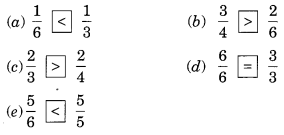
Make five more such problems yourself and solve them with your friends.
Question 5.
How quickly can you do this? Fill appropriate sign. ‘<‘, ‘=’, ‘>’.
![]()
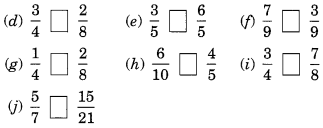
Solution:
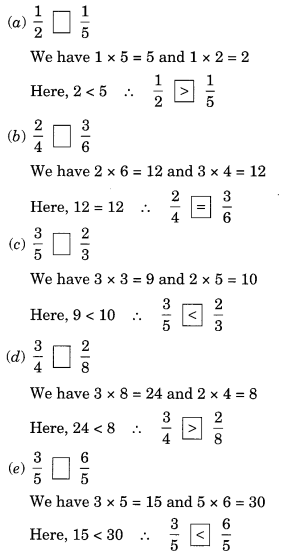
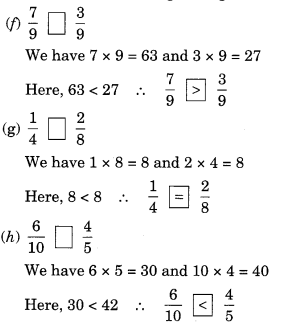
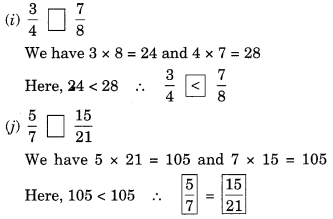
Question 6.
The following fractions represent just three different numbers. Separate them into three groups of equivalent fractions, by changing each one to its simplest form.
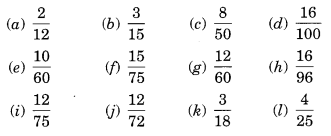
Solution:
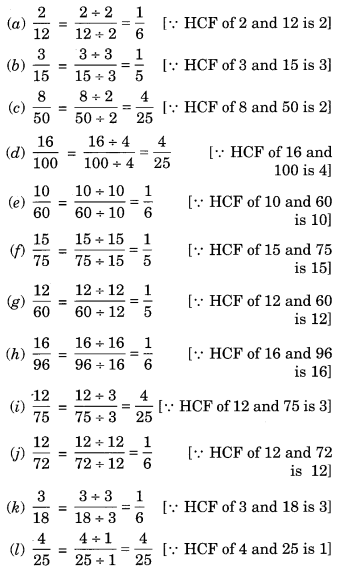
Now grouping the above fractions into equivalent fractions, we have
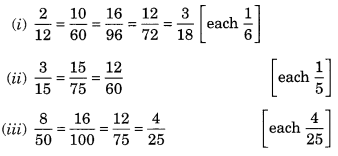
Question 7.
Find answers to the following. Write and indicate how you solved them.
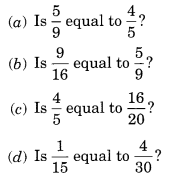
Solution:
![]()
By cross-multiplying, we get
5 x 5 = 25 and 4 x 9 = 36
Since 25 ≠ 36

By cross-multiplying, we get
9 x 9 = 81 and 16 x 5 =80
Since 81 ≠ 80

By cross-multiplying, we get
4 x 20 = 80 and 5 x 16 = 80
Since 80 = 80

By cross-multiplying, we get
1 x 30 = 30 and 4 x 15 = 60
![]()
Question 8.
Ila read 25 pages of a book containing 100 pages.
Lalita read \(\frac { 2 }{ 5 }\) of the same book. Who read less?
Solution:
Ila reads 25 pages out of 100 pages.
![]()
Lalita reads \(\frac { 2 }{ 5 }\) of the same book.
Comparing \(\frac { 1 }{ 4 }\) and \(\frac { 2 }{ 5 }\) , we get
1 x 5 = 5 and 2 x 4 = 8
Since 5 < 8
∴ \(\frac { 1 }{ 4 }\) < \(\frac { 2 }{ 5 }\)
Hence Ila reads less pages.
Question 9.
Rafiq exercised for \(\frac { 3 }{ 6 }\) of an hour, while Rohit exercised for \(\frac { 3 }{ 4 }\) of an hour. Who exercised for a longer time?
Solution:
Rafiq exercised for \(\frac { 3 }{ 6 }\) of an hour.
Rohit exercised for \(\frac { 3 }{ 4 }\) of an hour.
Comparing \(\frac { 3 }{ 6 }\) and \(\frac { 3 }{ 4 }\) , we get
3 x 4 = 12 and 3 x 6 = 18
Since 12 < 18
∴ \(\frac { 3 }{ 4 }\) > \(\frac { 3 }{ 6 }\)
Hence Rohit exercised for longer time.
Question 10.
In a class A of 25 students, 20 passed in first class, in another class B of 30 students, 24 passed in first class. In which class was a greater fraction of students getting first class?
Solution:
In class A, 20 students passed in first class out of 25 students.
∴ Fraction of students getting first class
![]()
In class B, 24 students passed in first class out of 30 students.
∴ Fraction of students getting first class
![]()
Comparing the two fractions, we get \(\frac { 4 }{ 5 }\) = \(\frac { 4 }{ 5 }\)
Hence, both the class A and B have the same fractions.


















NCERT SolutionsMathsScienceSocialEnglishHindiSanskritRD Sharma